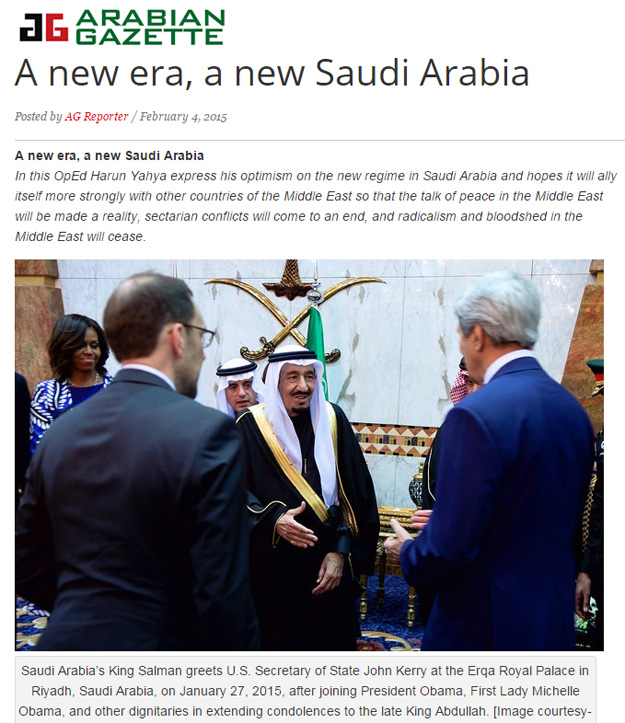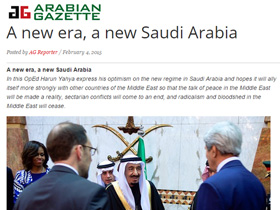
Saudi Arabia – the lands where Islam was revealed, the great state of the Arabian peninsula, the heart of the Middle East. In addition to uniting tribes with profound differences and building a country on the Arabian Peninsula, Ibn Saud is one of the great guardians of the Middle East with its many ups and downs.
Following the death last week at the age of 91 of the Saudi king, the new era in Saudi Arabia has been discussed, and there has been much talk of human rights and reforms. King Abdullah’s successor, Salman bin Abdulaziz, is a strong and well-known figure who served as governor for 48 years and from time to time deputized for the king. Throughout his time as governor the new king, who is known for his relationship with charitable associations, was much admired as making no concessions to corruption and exhibiting a good management style.
Of course reform in Saudi Arabia has been much discussed together with the new era. Saudi Arabia, with its own interpretation of Shariah laws, is the subject of widespread criticism regarding human and women’s rights. The country’s founding ideology makes any progressive steps on the subject of reforms and ‘rights’ difficult. One of the main obstacle to reforms, of course, is that they will be met with a hostile reception from tribes and religious leaders.
Nonetheless, when in his lifetime King Abdullah is known to have taken significant and courageous steps on the subject of reform. Readers will recall that in 2009 Abdullah signed up to a first by permitting equal education for men and women at the King Abdullah University for Science and Technology. He altered the traditional Wahhabi rule that men should wear white, and women black, allowing colored clothing. Women writers were allowed to attend fairs, while a music reform took place on state channels, without unsettling conservative circles, however. Women began taking their place in the Consultative Assembly. Another first was female Saudi athletes participating at the Olympics. And, women will be able to vote for the first time in elections in 2015.
The king’s response to criticism of the reforms was unequivocal: ‘'We know that Muslim women have had to combat many difficulties during the course of history. A balanced modernization will benefit and is necessary for our Islamic values. There is no room for weakness and indecision these days.''
King Abdullah was the subject of critical barbs from some Wahhabi scholars for his measures, which while lagging far behind Europe were very courageous within his own culture, while the West was delighted.
Saudi Arabia is known for the existence of its tribes. King Salman’s words that “democracy was not possible in the kingdom. If we did every tribe would be a party and then we would be like Iraq and would have conflicts” are thought-provoking. A state structure based on a family and built on a monarchy will of course be fragile. Readers will recall that the kingdom took extraordinary precautions to ensure that the Arab Spring, which started in the Middle East in 2011, should not break out in Saudi Arabia, and the danger was, with difficulty, overcome. Had such a thing happened, the movement in question would not have remained limited to one region, but would spread to all the kingdoms in the Gulf and, as King Salman said, would have led to turmoil in Iraq, the vital artery of the Middle East.
However, it is also a fact that the regime being a monarchy is not obstacle to the application of the demands of democracy. With their historical responsibilities and symbolic significance, monarchies are excellent things. Implementing democratic benefits in such a way as not to harm monarchies will further strengthen countries. Peoples who are happy with their governments will pay no heed to uprisings.
The new King Salman is not known as a reformist, though he is a good statesman. However, nobody doubts that he will follow in the wake of King Abdullah’s reforms. There are expectations that Salman will be a successful king and statesman, and hopes for Saudi Arabia. To summarize;
Saudi Arabia is the country where Islam was born, the heart of the Middle East and a powerful place in material terms. It is one of the main foundation stones that can bring peace to the Middle East. It has the strength and prestige to bring that about. We therefore hope that the new regime will ally itself more strongly with other countries of the Middle East so that the talk of peace in the Middle East will be made a reality, sectarian conflicts will come to an end and Islamic unity will be established, and that radicalism and bloodshed in the Middle East will cease.
In that context, we also need to touch on relations with Turkey. Good relations between a powerful country and NATO member at the gateway to the Middle East and Saudi Arabia, the heart of the Middle East have always been of vital importance; bearing in mind the current situation in the Middle East, these relations are now even more important than ever. Of course, countries may have differences of opinion. But it is wrong to allow such differences to metamorphose into giant problems that alienate countries from one another. Remaining friends and allies despite differences of opinion means stability. And it is that stability that the Middle East needs most of all.
Therefore, it is hugely important for the alliance between Turkey and Saudi Arabia to be kept sound and strong despite differences of opinion and regional opposition. In this way, there can be a more determined campaign to build peace. Together, a solution to the tragedy in Iraq and the drama in Syria can be found.
With its new administration, Saudi Arabia must initiate a new policy of alliance and peace. Steps taken in the reign of King Abdullah must be reinforced, greater importance must be attached to human rights, and especially women’s rights, and a powerful alliance between Turkey and Saudi Arabia must be built to ensure peace from north to south.
Adnan Oktar's piece on Arabian Gazette:
http://www.arabiangazette.com/a-new-era-saudi-arabia-20150204/


